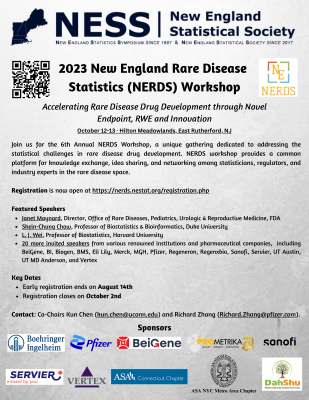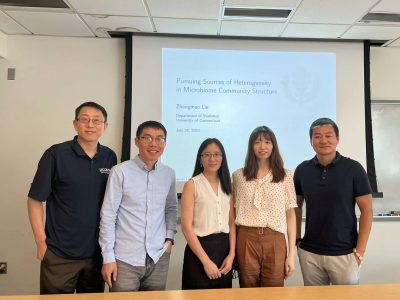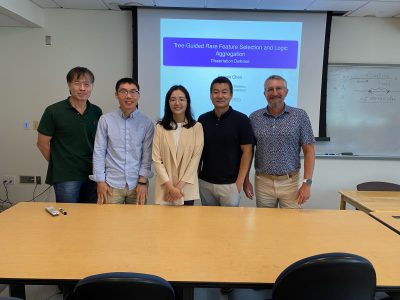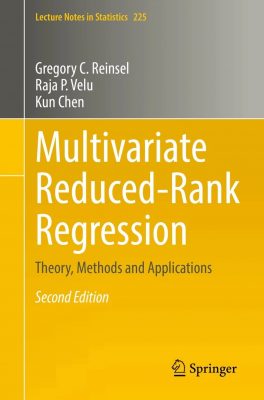Kun Chen is elected as a member of the Board of Directors (2024-2026) of the International Chinese Statistical Association (ICSA). It is truly an honor, and Chen is very grateful for the trust and support of ICSA members.
Author: Chen, Kun
Join us at NERDS 2023 (10/12-10/13)
Join us for the 6th Annual NERDS Workshop, a unique gathering dedicated to addressing the statistical challenges in rare disease drug development. NERDS workshop provides a common platform for knowledge exchange, idea sharing, and networking among statisticians, regulators, and industry experts in the rare disease space.
Website: nerds.nestat.org
Contact: Co-Chairs Kun Chen (kun.chen@uconn.edu) and Richard Zhang (Richard.Zhang@pfizer.com).

Zhongmao Liu defended her thesis. Congratulations, Dr. Liu!
On July 18, 2023, Ph.D. student Zhongmao Liu successfully defended her thesis entitled “Pursuing Sources of Heterogeneity in Microbiome Community Structure.” Zhongmao’s committee consists of Drs. Kun Chen, Yuwen Gu, Jun Yan, and Yanjiao Zhou. Thank you all for your support!
After graduation, Zhongmao will join FDA.
Congratulations, Dr. Liu!

Jianmin Chen defended her thesis. Congratulations, Dr. Chen!
On July 18, 2023, Ph.D. student Jianmin Chen successfully defended her thesis entitled “Rare Feature Selection and Logic Aggregation”. Jianmin’s committee consists of Drs. Robert Aseltine, Kun Chen, Ming-Hui Chen, and Yuwen Gu. Thank you all for your support!
After graduation, Jianmin will join UPenn Biostat as a Post Doc.
Congratulations, Dr. Chen!

Project on utilizing ML for studying soil health funded by USDA
Our project “Elucidating the impact of nanoagrichemicals on paddy soil health and rice production through combined greenhouse studies and machine learning” is funded by USDA. The project is a collaboration with Dr. Samuel Ma (PI) and Dr. Fugen Dou (Co-PI) at TAMU. Chen (Co-PI) will guide the experimental design and data collection and utilize innovative statistical and machine-learning methods in the proposed research.
Chen promoted to full professor
Chen has been promoted to Professor in Statistics, effective August 2023.
Book on reduced-rank regression is published by Springer
Chen’s co-authored book on reduced-rank regression has been published by Springer.
Reinsel, G. C., Velu, R. P., and Chen, K. (2022) Multivariate Reduced-Rank Regression: Theory, Methods and Applications, 2nd Edition. Springer.
The book’s first edition has profoundly influenced Chen’s research since his graduate study at the University of Iowa under the supervision of Professor Kung-Sik Chan. Chen is honored and humbled to be a co-author in this new edition.

This book provides an account of multivariate reduced-rank regression, a tool of multivariate analysis that enjoys a broad array of applications. In addition to a historical review of the topic, its connection to other widely used statistical methods, such as multivariate analysis of variance (MANOVA), discriminant analysis, principal components, canonical correlation analysis, and errors-in-variables models, is also discussed.
This new edition incorporates Big Data methodology and its applications, as well as high-dimensional reduced-rank regression, generalized reduced-rank regression with complex data, and sparse and low-rank regression methods. Each chapter contains developments of basic theoretical results, as well as details on computational procedures, illustrated with numerical examples drawn from disciplines such as biochemistry, genetics, marketing, and finance.
This book is designed for advanced students, practitioners, and researchers, who may deal with moderate and high-dimensional multivariate data. Because regression is one of the most popular statistical methods, the multivariate regression analysis tools described should provide a natural way of looking at large (both cross-sectional and chronological) data sets. This book can be assigned in seminar-type courses taken by advanced graduate students in statistics, machine learning, econometrics, business, and engineering.
Jianmin Chen won Poster Award at UConn Stat Conference
PhD student Jianmin Chen won Poster Award at the Special Conference Celebrating UConn Department of Statistics 60th Anniversary in October 2022. Her post was based on our joint work “Tree-guided rare feature selection and logic aggregation with electronic health records data”.
Congratulations to Jianmin!
Project on integrative learning of quantum dots is funded by NSF
Our project on “Integrative Learning of Fluorescence Fluctuations in Perovskite Quantum Dots Using A Data Science Assisted Single-Particle Approach” has been funded by NSF. This is a collaboration between Dr. Jing Zhao (PI) from UConn Chemistry, Dr. Chen (Co-PI) from UConn Stat, and Dr. Ou Chen (Co-PI) from Brown Chemistry. Our long-term goal is to integrate materials science, single-particle spectroscopy, and modern data science approaches to develop and characterize QDs for desired applications.
Chen elected Fellow of the American Statistical Association
Dr. Kun Chen has been elected as a Fellow of the American Statistical Association (ASA)!
The Designation of ASA Fellow has been a significant honor for nearly 100 years.